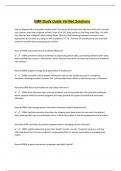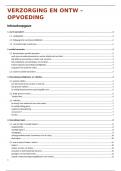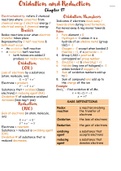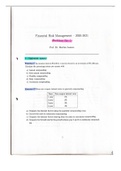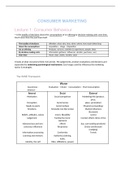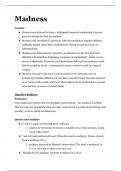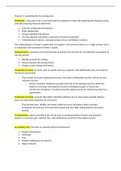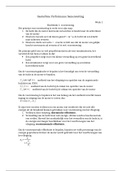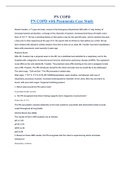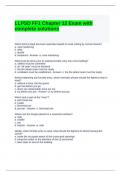You are dispatched to a possible cardiac arrest. You arrive 10 minutes from the time of the call. You and
your partner enter the residence to find a man in his 50's lying supine on the living room floor. His wife
says that he "just collapsed" while eating dinner. Which of the following treatment choices is most
appropriate at this time according to AHA Guidelines? ✔️✔️Perform 30 compressions and then look
inside the mouth before attempting to ventilate
How do EMRs assist with clinical workflow efficiency?
✔️✔️ EMRs streamline clinical workflows by organizing patient data, automating administrative tasks,
and providing easy access to information, which reduces time spent on manual processes and enhances
care delivery.
How do EMRs support emergency preparedness in healthcare?
✔️✔️ EMRs centralize critical patient information that can be rapidly accessed in emergency
situations, allowing providers to make fast, informed decisions, which is vital during crises or disasters.
How does EMR help track healthcare-associated infections?
✔️✔️ EMRs track infection rates, monitor antibiotic use, and provide alerts for potential outbreaks,
which supports infection control programs and helps prevent the spread of healthcare-associated
infections.
How do EMRs help manage patient transitions between hospital departments?
✔️✔️ EMRs facilitate seamless transitions by allowing each department to view real-time patient
data, ensuring that care is coordinated and no critical information is lost during departmental transfers.
How does EMR contribute to patient empowerment in managing chronic diseases?
✔️✔️ EMRs enable patients to access their health records, monitor treatment progress, and stay
informed about their chronic conditions, empowering them to actively participate in managing their
health.
How do EMRs support vaccination campaigns and public health?
,✔️✔️ EMRs document and track immunization status, helping healthcare providers identify
unvaccinated patients, which supports vaccination campaigns and helps prevent disease outbreaks in
communities.
How does EMR support legal compliance in healthcare?
✔️✔️ EMRs ensure legal compliance by maintaining accurate, complete, and timestamped records of
patient encounters, which are essential for meeting healthcare regulations and standards.
What is the role of EMRs in clinical audits?
✔️✔️ EMRs provide a reliable source of patient data for clinical audits, allowing organizations to
evaluate and improve clinical practices, identify gaps, and ensure adherence to evidence-based
guidelines.
How do EMRs support medication reconciliation during patient discharge?
✔️✔️ EMRs ensure accurate medication reconciliation by listing current medications and providing
discharge instructions, which helps prevent errors and ensures patients leave with the correct
prescriptions.
How does EMR help healthcare providers detect early signs of disease?
✔️✔️ EMRs track health data trends, enabling providers to identify unusual patterns and early
warning signs, which supports preventive care and early diagnosis, ultimately improving patient
outcomes.
How do EMRs help manage prescription renewals?
✔️✔️ EMRs streamline prescription renewals by tracking medication history and expiration dates,
allowing providers to quickly approve refills and reducing delays for patients.
How does EMR support real-time collaboration among healthcare providers?
✔️✔️ EMRs enable real-time sharing of patient information across healthcare teams, facilitating
collaboration and communication, which improves the quality and coordination of care for patients.
How do EMRs improve patient handover processes?
,✔️✔️ EMRs ensure that accurate and up-to-date patient information is available during handovers,
which reduces miscommunication and supports continuity of care during shift changes or transfers.
How does EMR support patient privacy and data security?
✔️✔️ EMRs use encryption, access controls, and audit trails to protect patient information, ensuring
that only authorized personnel can view or modify data, which helps maintain privacy and security.
How do EMRs aid in identifying patients eligible for clinical trials?
✔️✔️ EMRs provide searchable patient data, allowing researchers to identify patients who meet
eligibility criteria for clinical trials, which helps advance medical research and innovation.
How does EMR assist in the evaluation of treatment effectiveness?
✔️✔️ EMRs store detailed patient data that allows providers to analyze outcomes and assess the
effectiveness of treatments over time, enabling evidence-based adjustments to care plans.
How do EMRs support the monitoring of patient progress in rehabilitation?
✔️✔️ EMRs track therapy sessions, outcomes, and improvement in functional abilities, allowing
providers to monitor rehabilitation progress and adjust therapy plans as needed for optimal results.
How do EMRs help detect adverse drug events?
✔️✔️ EMRs alert providers to potential adverse drug interactions based on documented patient
medications and allergies, which reduces the risk of harmful drug events and enhances patient safety.
How does EMR contribute to preventive healthcare?
✔️✔️ EMRs provide reminders for screenings, vaccinations, and follow-up appointments, helping
providers focus on preventive care and encouraging patients to maintain proactive health management.
How do EMRs aid in reducing redundant testing?
✔️✔️ EMRs provide access to previous test results, allowing providers to avoid unnecessary or
repeated tests, which reduces healthcare costs and improves patient comfort.
, How does EMR improve patient documentation for legal purposes?
✔️✔️ EMRs provide comprehensive, timestamped records of patient interactions and treatments,
which can serve as legally valid documentation in case of disputes or audits.
How do EMRs support telehealth services?
✔️✔️ EMRs allow remote access to patient records, facilitating telehealth consultations and enabling
providers to offer virtual care, which is convenient for patients and supports broader access to
healthcare.
How do EMRs facilitate better communication with patients’ families?
✔️✔️ EMRs store and organize contact details and consent information, making it easier for providers
to communicate with patients’ families about their health status and care plans when needed.
How do EMRs aid in the analysis of patient readmission causes?
✔️✔️ EMRs track patient histories and reasons for readmissions, helping providers identify trends and
address factors contributing to readmissions, ultimately reducing their frequency.
How do EMRs assist in creating personalized patient care plans?
✔️✔️ EMRs contain detailed patient information, including medical history, lifestyle, and preferences,
allowing providers to create care plans tailored to individual patient needs and goals.
How does EMR contribute to improving healthcare quality?
✔️✔️ EMRs support quality improvement by providing accurate data, tracking outcomes, and helping
identify areas for improvement, which drives continuous enhancements in patient care.
How do EMRs help healthcare providers in making faster clinical decisions?
✔️✔️ EMRs provide real-time access to patient data and diagnostic support, enabling healthcare
providers to make quicker, informed decisions during consultations or emergency situations.
What is the role of EMRs in allergy documentation?

